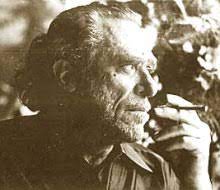
Every once in a while, you stumble across a book that proves an unexpected charmer. David Markson’s Reader’s Block, a book I keep near to dip into, is one of those rare treats.
Ostensibly, it’s about an old reader who sits down to write a novel. Trouble is, he suffers not so much from writer’s block as reader’s block. He is so well-read and knows so many facts about artists and the arts that he would put Ken Jennings to shame. His head is literally swimming with obstructions of knowledge.
The book, then, is not laid out in paragraph form so much as stream-of-consciousness form, where the stream is a roiling with trivia about poets, artists, composers, painters, philosophers, etc.
To give you a taste, I’ll share a few notable ones about poets and other famous sorts below. Some I knew already, but most I did not. I wonder how many will lodge into my long-term memory vs. here today, gone tomorrow? Probably more than I think. I’m pretty good when it comes to the “Useless Facts for $500” category on Jeopardy!
- There is no mention of Ockham’s Razor in anything Ockham ever wrote.
- Not one of Thomas Hardy’s first three novels sold more than twenty copies.
- Wallace Stevens told Robert Frost his poems were too often about things. Frost told Stevens his were about bric-a-brac.
- Tolstoy and Gandhi corresponded.
- Berryman’s name was originally John Smith. He adopted his stepfather’s name when his mother remarried.
- Walt Whitman more than once wrote anonymous favorable reviews of his own work.
- Thomas Hobbes was born prematurely when his mother became hysterical at the approach of the Spanish Armada.
- The tyranny of the ignoramuses is insurmountable and assured for all time. Said Einstein.
- Balzac called Ann Radcliffe a better novelist than Stendhal.
- Pouring out liquor is like burning books. Said Faulkner.
- Robert Frost had exactly five poems accepted in the first seventeen years in which he was submitting.
- Baudelaire spent two hours a day getting dressed.
- Being a successful reader of poetry on stage, said Akhmatova, is not necessarily the same as being a writer of successful poetry.
- Twenty American publishers rejected Elie Wiesel’s Night.
- Johnny Keats piss-a-bed poetry, Byron called it.
- Aesop was executed for embezzlement.
- Philip Larkin: I wouldn’t mind seeing China if I could come back the same day.
- Edna St. Vincent Millay died at the first light of morning after having sat up all night reading a new translation of the Aeneid.
- Immature poets imitate; mature poets steal. Said Eliot.
- Housman published a volume entitled Last Poems in 1922. And lived until 1936.
- Captured by Moorish pirates at sea, Cervantes spent five years as a slave before being ransomed.
- Stalin was one of Maxim Gorky’s pall bearers.
- An enormous dungheap, Voltaire dismissed the sum of Shakespeare as.
You get the idea. One man’s block is another man’s page-turner. Or, if you’ve already read it and vaulted the blocks with pleasure, another man’s page-dipper, a constellation most any reader would admire.

